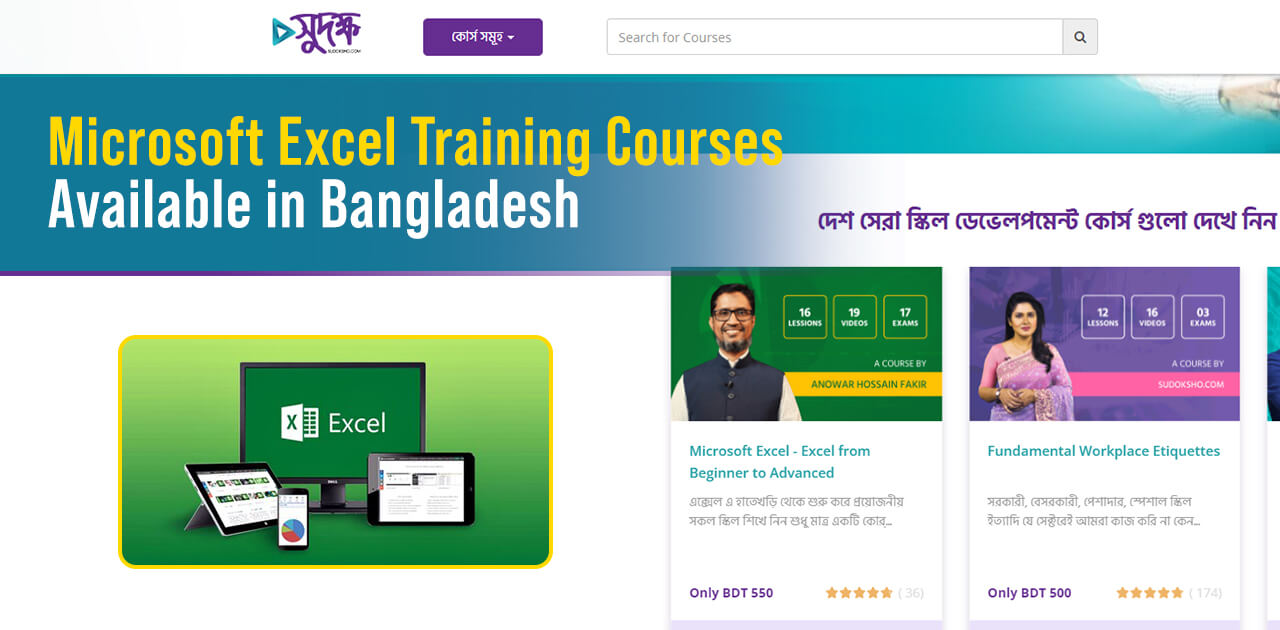Microsoft Excel is a powerful tool that offers tremendous benefits to businesses and individuals. It is the go-to application for data analysis, budgeting, financial modeling, and many more tasks that require precise calculations and data management. In today’s job market, proficiency in Microsoft Excel has become essential for professionals across all industries. This is why we have designed various Microsoft Excel training courses in Bangladesh that cater to the diverse needs of learners.
In this blog, we will cover everything you need to know about Microsoft Excel, including its importance, advantages of excel proficiency for businesses and individuals, types of training courses available in Bangladesh, what to expect from excel training courses, how to choose the right course and success stories from previous trainees. Read on to discover how you can boost your skills with our comprehensive Microsoft Excel training program.
[toc]
Applications of Microsoft Excel
Microsoft Excel is a powerful and flexible spreadsheet application that enables users to perform data analysis with ease. It is widely used for financial performance analysis, budgeting and forecasting, and other business-related tasks. With features such as pivot tables, power pivot, conditional formatting, and the index function, Excel allows for efficient data manipulation and customization.
Through Excel training, professionals can enhance their skills in workforce management, financial reporting, business profit analysis, and more. The proficiency in Excel can also lead to improved job prospects as it is a highly sought-after skill in many industries. Whether you are a beginner or an advanced user, learning Excel can significantly increase your productivity and efficiency in managing data.
What is VBA?
Visual Basic for Applications (VBA) is a programming language that enables users to automate tasks in Microsoft Excel. It allows you to create custom functions and macros, which simplifies complex operations and enhances productivity. By learning VBA, you can streamline your workflow and perform repetitive tasks more efficiently.
Additionally, VBA can help you manipulate data and generate reports quickly and accurately. As a result, it is an essential skill for anyone who works with Excel regularly or relies on spreadsheets for data analysis.
Importance of Microsoft Excel Training
Excel training can be a game-changer for individuals looking to enhance their proficiency in data analysis and management. It equips professionals with crucial skills that can greatly aid in project management and workforce optimization. The training provides essential tools for business profit analysis, enabling proficiency in conditional formatting, goal seek, and index function usage. Additionally, it empowers professionals to create custom views and dashboards, enhancing their ability to make informed decisions using simple data.
Professionals who undergo Excel training are better equipped to handle complex data sets and analyze them efficiently. They can also use Excel’s powerful features such as pivot tables, charts, and graphs to visualize data and identify trends quickly. With these skills, they can provide valuable insights that drive business growth.
Moreover, Excel training is not just limited to the technical aspects of data analysis. It also teaches professionals how to present data in a clear and concise manner. This helps them communicate complex information effectively to stakeholders across different departments.
In conclusion, Excel training is an excellent investment for professionals looking to upskill themselves in an increasingly data-driven world. By mastering these essential tools, they can improve their efficiency at work and contribute significantly towards the success of their organization.
Relevance of Excel Skills in Today’s Job Market
Excel proficiency is essential for businesses as it enables email address management and data analysis, both of which are crucial for financial performance evaluation. With mastery of Excel skills, individuals can unlock numerous opportunities in spreadsheet applications, including sparklines, min/max functions, and separator function. Proficiency in Microsoft Excel is vital for profit analysis and email management, providing an efficient and straightforward approach to data analysis.
Apart from being a valuable tool for evaluating business performance, Excel can also be used to manage large amounts of data. Businesses that rely on extensive databases will find Excel particularly helpful for organizing and analyzing data. Additionally, having a good understanding of Excel can help individuals present complex information in an easily digestible format using charts and graphs. This skillset is especially useful in financial modeling, budgeting, forecasting and performing what-if analyses.
By mastering Excel functions such as VLOOKUP or PivotTables, you can transform raw data into usable information that can drive better decision-making processes. It’s worth noting that proficiency in Excel is highly sought after by employers across different industries because of its versatility and practicality. In conclusion, mastering MS Excel can open up numerous opportunities for professionals across various fields by providing them with the necessary tools to analyze large sets of data quickly and efficiently.
Advantages of Excel Proficiency for Businesses
Proficiency in Excel streamlines workforce optimization and checklists management, empowering business profit analysis and macro management. It enables the utilization of powerful tools like pivottables and powerpivot function while aiding in email address management, dashboard creation, and tabs management. Additionally, Excel proficiency is essential for data analysis, MS Excel, and MS management, making it an indispensable resource for businesses.
Available Microsoft Excel Training Courses in Bangladesh
Sudoksho is an online platform that offers certification courses in Excel training in Bangladesh. The courses are designed to enhance the proficiency and skills of the workforce by covering various areas such as powerful tool management, pivottables, powerpivot function training, email management, macro training, and dashboard creation. In addition to these, Sudoksho also provides MS Excel, MS management, and data analysis certification training that enables learners to gain hands-on experience in simple data management and workforce skills development. These courses are highly beneficial for individuals who want to improve their Excel skills and increase their employability in today’s competitive job market.
Overview of Excel Basic Training Course
Basic Excel training is a program that covers various fundamental skills required to work with spreadsheets. This training includes basic proficiency in functions like email, tabs, and separators. It also encompasses coaching on managing MS Excel, email addresses, and spreadsheet applications. The course not only facilitates proficiency in PivotTables, PowerPivot function, and macros but also covers data analysis, dashboard management, and email address handling.
The course offers a simple yet comprehensive approach to data management and analysis. Its significance lies in the fact that these skills are essential for any business or organization that deals with data regularly. By mastering these basic functions, you can ensure efficient handling of data and smooth workflow. Moreover, having a good grasp of these features can also help you save time and reduce errors while working with large datasets.
In-depth Look into Advanced Excel Training
Advanced Excel training provides individuals with the opportunity to master data analysis and pivot tables. The program focuses on email management, robust tool handling, and enhancing workforce skills. Upon successful completion of the course, learners receive a proficiency certification in macro and dashboard management.
In addition to these essential skills, participants will also delve into email address management, tab and separator functions, and MS management training, further enriching their skillset. Advanced Excel training is ideal for professionals who work with large amounts of data or want to improve their analytical capabilities. It provides a solid foundation in Microsoft Excel’s advanced features, allowing learners to work more efficiently and effectively. Whether you’re a beginner or an experienced user looking to take your skills to the next level, advanced Excel training can help you achieve your goals.
Brief on Corporate Excel Training for Businesses
Corporate Excel training is an effective way to enhance workforce skills, covering powerful tool management, pivottables, and powerpivot function training. The training provides proficiency certification, email management, and dashboard training. The course enables participants to develop expertise in tabs management, separator function, and MS management.
By honing their data analysis, Excel, and pivottables skills, participants can streamline business operations and gain a competitive edge. Sudoksho offers excellent Excel training programs that cover email address management, macro training, and other essential workforce skills. With Sudoksho’s comprehensive Excel training program, participants can acquire the necessary skills to boost productivity in their workplace.
What to Expect from Excel Training Courses
The certification program includes a comprehensive training in data analysis, MS Excel, and dashboard management. Participants will learn how to manage email addresses and tabs, use separator functions, and develop workforce skills.
The courses cover powerful tool management, pivot tables, power pivot, and MS management training. The program also offers proficiency certification, macro training, and email management. Completion of the program will provide expertise in data analysis, email management, dashboard creation, and MS management. Students will gain valuable skills that can be applied in various industries such as finance, marketing, and healthcare.
Course Content and Structure
The training program covers a range of essential skills for the workforce, including MS Excel, macros, and dashboard management. Participants can expect to learn about powerful tool management, PivotTables, PowerPivot, and separator function training. The course also includes data analysis, tab management, and MS management training.
Upon completion of the program, participants will receive a certification in data analysis, MS Excel, and dashboard management training. The training encompasses fundamental concepts such as simple data analysis and email address management as well as advanced topics like powerful tool usage and PivotTables.
It is worth noting that user-friendly dashboards are becoming increasingly important for companies to track their progress effectively. Participants with proficiency in dashboard creation will have an edge over others. Furthermore, the ability to use MS Excel efficiently can save time and effort in managing large datasets. Overall the training program provides valuable insights into a variety of skills that are essential for any individual looking to enhance their professional development in bangladesh.
Hands-on Experience and Live Projects
The training program offered provides certification in proficiency, email address, macro, and MS management. The course delves into data analysis, tab management, separator function, and dashboard training for hands-on experience. Live projects are also a part of the training program that focuses on powerful tool management, pivottables, powerpivot, and workforce skills.
The course is designed to provide practical exposure to email address, MS Excel, pivottables, powerpivot and dashboard management training along with data analysis, email address, macro and MS management training. With this comprehensive program, participants can gain valuable skills that can help them advance their careers in data analysis and management.
Certification and Its Benefits
Certifications validate expertise, setting professionals apart. They enhance career prospects, often leading to higher income. Many certification courses offer continuing education units, ensuring ongoing skill development. Moreover, achieving professional certifications may be a requisite for career advancement, reinforcing the importance of staying updated with the latest industry trends and practices. These certifications serve as a testament to an individual’s commitment to continuous learning and improvement.
How to Choose the Right Excel Training Course
Choosing the right Excel training course involves aligning it with your learning goals and considering programs offering custom views and powerful tools. Look for courses covering a range of Excel skills, including data analysis, proficiency in project management, goal seek, conditional formatting, and the index function. Ensuring that the training encompasses these aspects will help you make the most of your learning experience.
Assessing Your Current Excel Proficiency
To stay competitive in today’s job market, it’s crucial to have a solid grasp of Excel and its various features. One way to assess your proficiency is by measuring your skills against industry standards, particularly in areas such as pivot tables and PowerPivot. This can help you identify any training needs or proficiency gaps that need to be addressed.
Excel checklists can be used to evaluate your ability to manage workforces and analyze financial performance. It’s important to look for training courses that are tailored to address specific areas where you may need improvement, such as handling large purchases or analyzing business profits using simple data.
By regularly refining your Excel skills, you’ll not only become more efficient and effective in your role but also increase your job opportunities and earning potential. Therefore, investing some time and effort in enhancing your Excel proficiency is a worthwhile investment in yourself and your career.
Identifying Your Learning Goals
Setting clear learning objectives is a crucial step in Microsoft Excel training. It involves defining specific goals that align with your skill level and career aspirations. Some of the key objectives include mastering sparklines and creating dashboards, setting targets for shortcuts, zoom, and separator usage, and identifying proficiency in macros, tabs, and specific functions like min, max, and certificate management.
Additionally, it is important to establish goals for email, MS Excel, word sheet, and word book proficiency to ensure a comprehensive learning experience. These objectives will help you stay focused during the training process and enable you to measure your progress effectively.
When identifying your learning objectives for Microsoft Excel training, it is also essential to consider your overall career goals. For instance, if you’re an accountant or financial analyst looking to enhance your skills in data management or reporting, then mastering pivot tables or using advanced formulas could be a priority.
On the other hand, if you’re a small business owner who wants to streamline their operations or track their finances better, then setting targets for managing inventory or creating budgets might be more relevant.
In conclusion, identifying clear learning objectives is vital for anyone seeking to improve their skills in Microsoft Excel. It enables you to tailor your training program according to your specific needs and goals while ensuring that you gain valuable knowledge that can benefit both you and your organization.
Considering Your Budget and Schedule
Selecting an Excel training course requires careful consideration of your budget and schedule. It is important to find a program that fits within your budget while offering certification at reasonable prices. You should also choose a training option that accommodates your schedule with flexibility, allowing you to learn at your own pace.
Another critical factor to consider is the range of skills covered in the training program. A comprehensive Excel training course should cover a wide variety of skills, including email management, word sheet proficiency, dashboard creation, and macro utilization. This will help ensure that you have a strong foundation in all areas of Excel usage and can apply these skills in practical situations.
Assessing these factors will enable you to find the right Excel training course that suits your needs and helps enhance your professional skill set. With the growing importance of data analysis and management in today’s business world, mastering Excel can prove invaluable in advancing your career prospects.
Success Stories from Previous Trainees
Excel training has been a transformative experience for professionals, significantly improving their skills and proficiency. This, in turn, has translated into improved financial performance for businesses as employees become more proficient. Certification achieved through Excel training has also led to workforce management skills being enhanced, resulting in successful transformation and improved business profitability.
Professionals who undergo Excel training are equipped with the knowledge and expertise needed to utilize powerful Excel tools effectively. This, in turn, drives overall success and transformation in various areas of business operations such as finance, accounting, data analysis, and project management. The benefits of Excel training are not limited to individual professionals or businesses; they extend to the wider economy as well.
Excel is a widely used software tool across various industries worldwide. As such, the availability of a skilled workforce can be crucial to a country’s economic growth and competitiveness. Investing in Excel training for employees can thus have far-reaching benefits both at the individual level and the macroeconomic level. In conclusion, Excel training is an essential tool that can facilitate personal growth, organizational efficiency, and national development.
How Excel Training Has Benefited Professionals
As a professional the benefits of mastering excel is tremendous. Now let’s have a look how excel training has benefited professionals.
- Enhanced Data Analysis Skills: Excel training equips professionals with powerful data analysis tools, enabling them to manipulate and analyze large datasets efficiently, leading to more informed decision-making.
- Improved Productivity: By mastering Excel functions and shortcuts, professionals can streamline their workflows, automate repetitive tasks, and handle complex calculations more quickly, significantly boosting productivity.
- Better Reporting and Visualization: Excel training helps in creating advanced, dynamic reports and visualizations, making it easier to interpret data and convey insights in a compelling manner to stakeholders.
- Versatility in Multiple Roles: Excel skills are applicable across various industries and job roles, from finance and accounting to marketing and project management, making professionals more versatile and adaptable.
- Increased Job Opportunities and Career Advancement: Proficiency in Excel is often a prerequisite for many jobs. Advanced Excel skills can lead to better job prospects, promotions, and the ability to take on more complex and high-value tasks.
Transformation Stories from Businesses
Excel training has emerged as a transformative tool for businesses, driving substantial financial gains and operational efficiencies. Mastery in data analysis, pivot table creation, and power pivot utilization endows employees with robust spreadsheet skills that directly contribute to optimizing business profitability. This training not only fortifies workforce capabilities but also catalyzes a notable uplift in overall business performance.
One of the key benefits of Excel training is the empowerment of employees to refine their work processes and automate routine tasks. This leap in efficiency not only saves precious time but also enhances accuracy and consistency in their outputs. The ability to adeptly analyze data equips businesses with the insights necessary to make strategic decisions, informed by discernible trends and patterns extracted from their data.
Additionally, Excel training is instrumental in enabling businesses to meticulously track their finances. It facilitates the creation of detailed budgets and forecasts, and aids in the vigilant monitoring of expenses and income. This level of financial oversight is crucial in pinpointing areas for cost reduction and avenues for revenue augmentation.
In essence, Excel training is a cornerstone for businesses intent on bolstering their financial health. It equips employees with essential spreadsheet competencies, fostering heightened productivity and profit optimization. Moreover, enhanced workforce management stemming from this training translates to a more effective allocation of resources, steering the organization towards its strategic objectives with greater precision and efficacy.
Why Should You Invest in Excel Training?
Excel training is a smart investment for businesses looking to improve their workforce management and ultimately boost their financial performance. The skills acquired from this training, such as data analysis, pivot tables, and conditional formatting, are essential in today’s workplace. Excel proficiency also extends to other Office applications, making it a valuable investment for both individuals and businesses.
Investing in Excel training can lead to increased productivity, better decision-making, and improved accuracy in data analysis. By having employees who are proficient in Excel, businesses can streamline their workflows and reduce errors that may cost time and money. Additionally, Excel training can help individuals stand out in the job market and advance their careers.
In today’s digital age, being proficient in Microsoft Excel is no longer just an added advantage; it’s a fundamental requirement. With many online courses available for different skill levels, anyone can enhance their Excel skills at their own pace. Investing in Excel training can have long-lasting benefits for both individuals and organizations alike.
Frequently Asked Questions for Microsoft Excel Training
How can Excel training benefit my career?
Excel training is an excellent investment for anyone seeking to boost their career prospects. By acquiring expertise in this software, you can improve your productivity and efficiency, which makes you a valuable asset to any organization. Advanced Excel functions enable you to analyze data more effectively and make better decisions, which can enhance your professional reputation and lead to new opportunities. Upskilling in Excel can also increase your earning potential, making it a smart choice for those looking to advance their careers. Additionally, proficiency in Excel can make work easier and more manageable, resulting in higher job satisfaction and motivation.
What is the best way to find Excel training in Bangladesh?
If you’re looking for Excel training in Bangladesh, the first step is to conduct an online search for reputable courses. Look for training centers or instructors with positive reviews and extensive experience in teaching Excel. Consider factors like course format, duration, and cost to find a program that suits your needs.
Another option is to ask colleagues or friends for recommendations based on their own experiences. They may have attended a course that they found particularly beneficial and can provide valuable insights into the quality of instruction and materials provided.
When selecting an Excel training program, it’s essential to ensure that the curriculum covers all the necessary topics required to become proficient in using the software. The course should include basic functions like data entry, formatting, and formulae as well as more advanced features like macros and pivot tables.
Additionally, it’s crucial to choose a training program that offers hands-on practice opportunities so that you can apply what you learn in real-life scenarios. This approach will help reinforce your learning and give you the confidence to use Excel effectively in your work.
What are some of the most useful features of Microsoft Excel?
Excel has become an indispensable tool for data analysis, thanks to its numerous powerful features. Sorting, filtering, and analyzing data are made simple with Excel. With pivot tables, you can effortlessly summarize large datasets. Conditional formatting is another useful feature that enables you to highlight essential information based on specific criteria. Excel’s formula and function capabilities are also a great advantage as they automate complex calculations and save time.
In addition to these features, Excel also offers various chart types that allow users to visualize their data in different ways. Users can create pie charts, bar charts, line graphs, scatter plots and many more from their data sets. Moreover, Excel is compatible with other software such as Microsoft Power BI which means that users can import their data from other sources into Excel for analysis.
Excel has evolved over the years and is now available in cloud-based versions like Microsoft 365 which allows users to access their files from anywhere at any time. The ability to collaborate on files in real-time with others is also an added advantage of cloud-based versions.
Overall, Excel continues to be the go-to tool for data analysis due to its user-friendly interface and its vast range of features that make it easier for users to analyze large amounts of data quickly and efficiently.
What are the benefits of taking a Microsoft Excel training course?
Enrolling in a Microsoft Excel training course can be highly advantageous for individuals looking to improve their skills and advance their career prospects. By mastering Excel’s advanced features and functions, you can streamline your work processes and increase productivity, leading to improved business outcomes. Additionally, the training is customizable to cater to your specific requirements and goals.
Improved proficiency in Excel can also result in better decision-making abilities. With the ability to analyze and interpret data effectively, you can make informed decisions that positively impact your organization’s bottom line. Moreover, proficiency in Excel has become a sought-after skill in various industries, making it a valuable asset for professionals across different job roles.
Whether you are an entry-level employee or a seasoned professional, investing time and effort into learning Excel can pay off in the long run by helping you stay competitive in today’s job market. Furthermore, with the availability of online courses, mastering Excel has never been easier or more accessible. So why not take advantage of this opportunity to upskill yourself and boost your career prospects?
Can I get certified in Microsoft Excel through training programs in Bangladesh?
If you’re based in Bangladesh and looking to obtain Microsoft Excel certification, there are several training programs available that can help you achieve your goal. It is important to choose a program that is recognized by Microsoft or its partners to ensure credibility. Some programs may offer certification exams separately from the training itself.
Certification in Excel can be a great way to showcase your proficiency with the program and enhance your resume for potential employers. The certification process typically involves passing an exam that tests your knowledge of Excel’s features and functions. This can include topics such as data analysis, formulas and functions, charting, and formatting.
Moreover, obtaining certification can also demonstrate your commitment to professional development and lifelong learning. Microsoft Excel is widely used across various industries, and having a certification in Excel can give you an edge over other candidates when applying for jobs that require proficiency with the software.
How To Recruit Employees: A Step-by-Step Guide for Hiring Success
What are the benefits of learning Microsoft Excel for professional development?
Microsoft Excel is an essential tool for professional development, and learning it can be a game-changer for your career. With enhanced data analysis, reporting, and planning skills, you can boost your productivity and stand out to potential employers. Possessing crucial Excel proficiency can expand your job prospects and earning potential in today’s competitive job market. Excel expertise also creates opportunities for career advancement and sets you apart as a valuable asset to any organization.
The importance of Microsoft Excel cannot be overstated in today’s world. It has become a ubiquitous tool across various industries, including finance, marketing, data analysis, and project management. Therefore, having advanced knowledge of Excel is critical to staying ahead of the curve in the professional world.
By mastering Excel’s advanced functions like pivot tables, macros, and conditional formatting, you can streamline tasks that would otherwise take longer to complete manually. You’ll also have the ability to analyze data with ease by creating insightful charts and graphs that allow you to spot trends and patterns quickly.
Possessing Excel proficiency will not only make you more efficient but also more desirable to employers searching for candidates who possess these skills. Moreover, it opens doors to various career paths such as financial analyst, business analyst or even data scientist.
In conclusion, learning Microsoft Excel is an investment in your future career growth and development. It helps increase your productivity while providing valuable skills that are highly sought after by employers across multiple industries.
What are some common functions or formulas used in Microsoft Excel?
Microsoft Excel is a powerful tool that offers a range of functions and formulas to help you analyze and manipulate data. Some of the commonly used functions include the SUM function, which adds up a specified range of cells; the AVERAGE function, which calculates the average value of a range of cells; the MAX and MIN functions, which return the highest and lowest values in a range; and the COUNT function, which counts the number of cells containing numbers.
In addition to these basic functions, Excel also offers more advanced formulas that can perform complex calculations and automate tasks. For example, the IF formula allows you to test whether a condition is true or false and perform different actions depending on the result. The VLOOKUP formula enables you to search for specific data in a table and retrieve related information from another column.
By mastering these functions and formulas, you can become more efficient at analyzing large amounts of data, making informed decisions based on your findings, and presenting your results in clear and concise formats.
What are the benefits of taking an Excel training course?
Excel training courses offer various advantages to individuals who want to learn new skills and improve their productivity. These courses teach advanced functions and formulas for effective data analysis, which help you make informed decisions based on data-driven insights. You can also learn how to create charts, graphs, and reports that simplify complex information for better data visualization.
In addition to these benefits, Excel training provides a competitive advantage in the job market. Employers seek individuals with advanced Excel skills as it helps streamline business processes and improve overall efficiency. By completing an Excel training course, you demonstrate your proficiency in using this powerful tool, making you a valuable asset to any organization.
Furthermore, Excel is used in various industries like finance, marketing, healthcare, education, and many more. Hence learning this software can open up a range of employment opportunities for you. Overall, taking an Excel training course is an excellent investment in your career growth and development.
Conclusion
There are several reasons why investing in Microsoft Excel training is beneficial for both individuals and businesses. In today’s job market, proficiency in Excel can give individuals a competitive edge and open up new career opportunities due to the increasing demand for Excel skills. Businesses can also benefit from this proficiency as it can streamline processes, improve data analysis, and enhance decision-making capabilities.
When selecting an Excel training course, there are some important factors to consider. Firstly, you should assess your current level of proficiency, identify your learning goals, and determine your budget and schedule. It’s also important to look for courses that offer hands-on experience, live projects, and certification opportunities to ensure a well-rounded learning experience.
Don’t just take our word for it – take a look at success stories from professionals who have completed Excel training. They have seen significant improvements in their skills and job performance. Similarly, businesses have experienced transformative outcomes after investing in Excel training. Therefore, there’s no reason to wait – start enhancing your skills by enrolling in a Microsoft Excel training course today!
















[…] dynamic environment, individuals must continuously update their skills and adapt to new challenges. Skills development, also known as competencies, enables individuals to stay ahead of the curve and meet the evolving […]